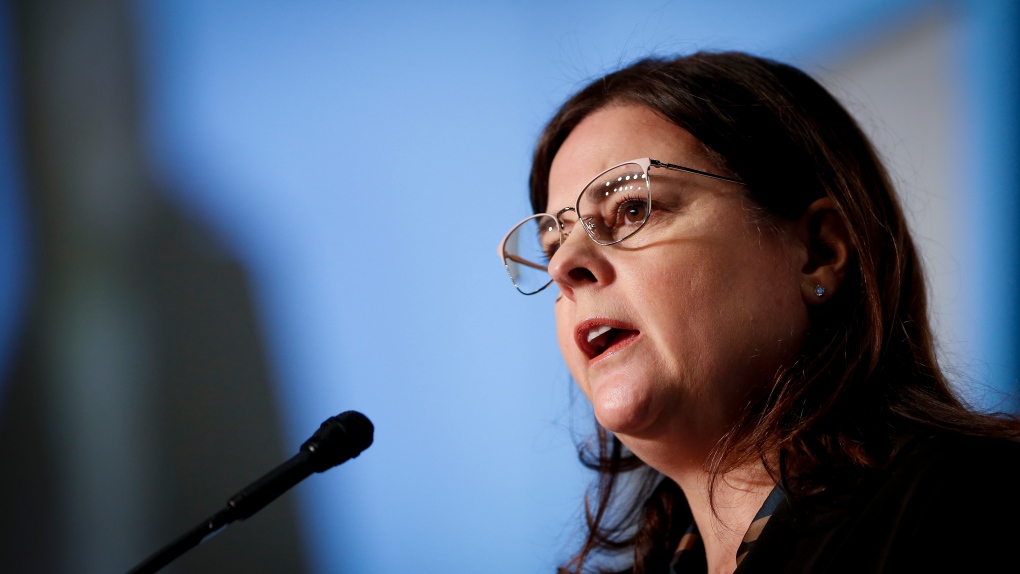Manitoba premier hints at financial aid, budget consultations float more tax cuts
 Manitoba Premier Heather Stefanson is hinting at more financial aid in the coming days to help people deal with inflation. Stefanson delivers her annual state of the province speech at the convention centre in Winnipeg, Thursday, Dec. 8, 2022. THE CANADIAN PRESS/John Woods
Manitoba Premier Heather Stefanson is hinting at more financial aid in the coming days to help people deal with inflation. Stefanson delivers her annual state of the province speech at the convention centre in Winnipeg, Thursday, Dec. 8, 2022. THE CANADIAN PRESS/John Woods
Manitoba Premier Heather Stefanson signalled Monday that another round of financial aid for people facing high inflation rates would come within a matter of days, and that it could be broader than previous cheques issued to middle- and lower-income earners.
"We'll have more specifics on that later this week, but I think we've heard from Manitobans that everyone's struggling to make ends meet these days," Stefanson told reporters Monday after a news conference where she announced funding for a new community centre.
"And so I think it's important that we look at everyone overall. There's very challenging inflationary pressures right now across the board."
The Progressive Conservative government issued cheques of $250 or more last fall to low-income seniors and low- and middle-income families with children under 18, while the Saskatchewan government issued $500 cheques to all adults.
Manitoba is also floating cheques and tax cuts as potential inflation-fighting measures in a pre-budget consultation survey that was posted online on the weekend.
The survey asks respondents to rank priorities such as strengthening heath care, building the economy and helping families make ends meet.
One question asks people whether they support or oppose various options for giving money back to Manitobans, if the government has the cash. The options include cutting the sales tax, reducing the gas tax, and issuing a one-time cheque to all Manitobans.
Stefanson said the government plans to both boost spending on health care and give money back to people.
"We need to have a balance between giving back to Manitobans but also making sure that we are looking at health care, education, social services," she said.
Manitoba has been running deficits every year since 2009, with the exception of a small $5-million surplus in 2019 before the COVID-19 pandemic drove the province into a deep deficit. The province has been moving to return to a balanced budget as the economy recovers from the pandemic and is forecast to get a 19 per cent jump in federal equalization payments in the fiscal year that starts in April.
Make Poverty History, a coalition of grassroots organizations, unions and health advocates, said the government should bolster social programs and benefits instead of cutting taxes.
"Tax cuts do not help families in need and starve the public purse of revenue needed to deal with social and economic priorities," Molly McCracken, the coalition's provincial chair, said in a recent news release.
The Tories' budget survey also touches on issues of mental health and public safety.
One question lists possible solutions to homelessness. Options include more funding for mental health, more funding for shelters and greater policing of areas experiencing homelessness.
"I think, bottom line, is that Manitobans are concerned for their safety and we want to ensure that they feel safe coming (to) downtown Winnipeg and The Forks," Stefanson said.
The Opposition New Democrats called for a different approach.
"When it comes to making our communities safer and giving people the dignity they deserve, the answer is better housing," NDP finance critic Mark Wasyliw said in a written statement.
This report by The Canadian Press was first published Jan. 23, 2023.
CTVNews.ca Top Stories

Trudeau's 2024: Did the PM become less popular this year?
Justin Trudeau’s numbers have been relatively steady this calendar year, but they've also been at their worst, according to tracking data from CTV News pollster Nik Nanos.
Manhunt underway after woman, 23, allegedly kidnapped, found alive in river
A woman in her 20s who was possibly abducted by her ex is in hospital after the car she was in plunged into the Richelieu River.
Toronto firefighters rescue man who fell into sinkhole in Yorkville
A man who fell into a sinkhole in Yorkville on a snowy Friday night in Toronto has been rescued after being stuck in the ground for roughly half an hour.
Wild boar hybrid identified near Fort Macleod, Alta.
Acting on information, an investigation by the Municipal District of Willow Creek's Agricultural Services Board (ASB) found a small population of wild boar hybrids being farmed near Fort Macleod.
Summer McIntosh makes guest appearance in 'The Nutcracker'
Summer McIntosh made a splash during her guest appearance in The National Ballet of Canada’s production of 'The Nutcracker.'
Death toll in attack on Christmas market in Germany rises to 5 and more than 200 injured
Germans on Saturday mourned both the victims and their shaken sense of security after a Saudi doctor intentionally drove into a Christmas market teeming with holiday shoppers, killing at least five people, including a small child, and wounding at least 200 others.
Overheated immigration system needed 'discipline' infusion: minister
An 'overheated' immigration system that admitted record numbers of newcomers to the country has harmed Canada's decades-old consensus on the benefits of immigration, Immigration Minister Marc Miller said, as he reflected on the changes in his department in a year-end interview.
22 people die in a crash between a passenger bus and a truck in Brazil
A crash between a passenger bus and a truck early Saturday killed 22 people on a highway in Minas Gerais, a state in southeastern Brazil, officials said.
Back on air: John Vennavally-Rao on reclaiming his career while living with cancer
'In February, there was a time when I thought my career as a TV reporter was over,' CTV News reporter and anchor John Vennavally-Rao writes.
































